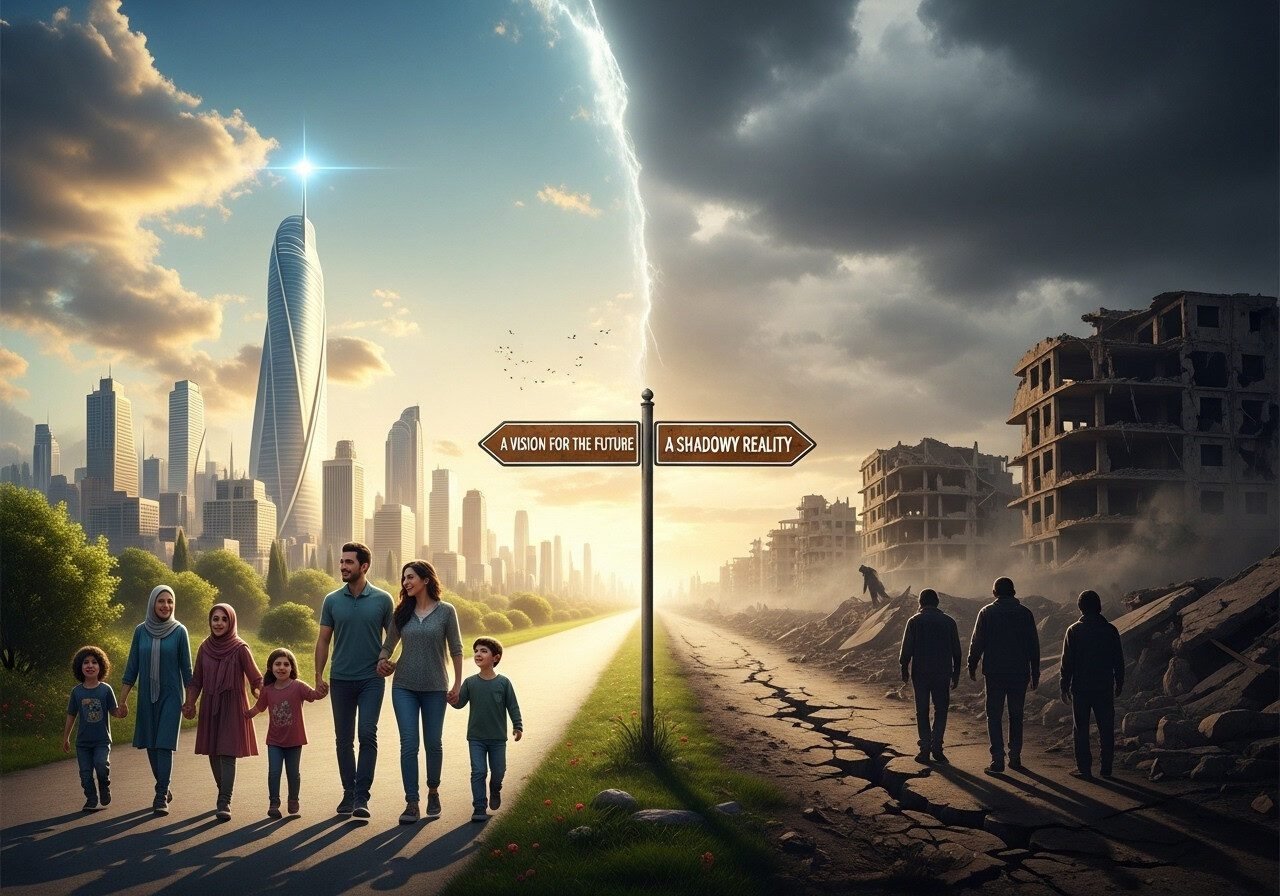Syria’s Crossroads: A Vision for the Future vs. a Shadowy Reality
A recent Reuters report, Syria is secretly reshaping its economy. The president’s brother is in charge, raises serious concerns about the country’s economic future after the conflict. The report claims a secret “shadow committee,” led by President Ahmed al-Sharaa’s older brother, Hazem al-Sharaa, is managing this transition.
This committee is allegedly making deals with powerful business figures from the Assad era. It offers them forgiveness in exchange for money and control over companies, a method the report describes as a practical but potentially ruthless form of deal-making over transparent government control. This approach prioritises immediate financial gain, but risks embedding old power structures into the new Syria.
This situation sharply contrasts with the hopeful vision for a fair and sustainable nation. This vision will be detailed in Dr Rayan Azhari’s upcoming book, Rewriting the Rules: A Vision for Syria’s Sustainable Reconstruction. Dr Azhari argues that Syria’s devastation provides a unique “blank slate” to build a transparent and wealthy nation from scratch. He believes the country can use modern finance and technology to leapfrog decades of development. However, the Reuters findings suggest this historic opportunity may be lost to the very corruption and favouritism Dr Azhari’s book aims to fix, creating a new facade over a rotten foundation.
The Ideal: Honesty as the Foundation of Trust
A key point in Dr Azhari’s book is that complete honesty and accountability are not just moral goals; they are vital economic strategies for a nation needing to build trust from zero. He is expected to argue that the total collapse of Syria’s old systems, while tragic, allows for the creation of “new institutions from scratch.”
This involves:
Building modern digital systems: This would make government operations, from tax collection to public spending, fully visible and traceable, drastically reducing opportunities for corruption.
Hiring based on merit: Implementing transparent, skills-based recruitment would directly challenge the cronyism that has historically plagued the nation.
Ensuring open and honest government purchasing from the start: All public contracts would be awarded through open, competitive bidding, preventing the backroom deals that enriched the old elite.
Dr Azhari believes these changes, which would be politically impossible to implement in a stable country with entrenched interests, could finally solve the long-standing problem of wasta (favouritism). By making fairness and transparency the default settings of the state, his vision aims to promote freedom, knowledge, and women’s rights as pillars of a new economy. The Reuters report, however, challenges this ideal. It reveals an economic restructuring process run by a committee whose “work, and even its existence, have never been announced by the government.” This profound secrecy directly opposes the vision of an open, trust-based state that Dr Azhari promotes.
Justice vs. Practicality: The Cost of Compromise
In his book, Dr Azhari is expected to describe transitional justice as a form of “economic infrastructure.” He sees it as essential for rebuilding the social trust and cooperation necessary for a functioning economy. Actions like investigating corruption, recovering stolen money, and holding wrongdoers accountable are framed as the “essential infrastructure for building the trust” needed for a stable new economy. The book will warn against repeating failures like Lebanon’s post-war reconstruction, where an estimated 40% of funds went to political elites, creating a cycle of debt and public anger.
However, the Reuters report suggests the new leadership has chosen to “negotiate to recoup much-needed cash” instead of prosecuting businesspeople suspected of stealing fortunes. This includes deals with rich Syrian tycoons, some under U.S. sanctions, who can keep “some profits and avoiding state prosecution, for a price.” This practical but secret approach weakens the “justice foundation for economic cooperation” that Dr Azhari’s work presents as vital for long-term stability. It sends a message that wealth can wash away past crimes, which risks creating deep and lasting anger among ordinary Syrians if one group of powerful elites is simply replaced by another.
The $30 Trillion Opportunity: Credibility is Key
A core idea in Dr Azhari’s vision is that Syria can attract a share of the over $30 trillion in global Environmental, Social, and Governance (ESG) investment. These investors look for “transformational opportunities” that offer both financial returns and positive social impact. Crucially, they require honest and accountable partners because their reputation and financial models depend on it. As Dr Azhari’s book will likely state, honesty is the “entry ticket to capital markets” in the 21st century.
The practices described in the Reuters report could put Syria’s access to this vital funding at risk. ESG investors conduct intense scrutiny and will not invest in secretive structures. Senior Western diplomats have warned that concentrating economic power with “shadow figures” could “impede foreign investment and credibility.” The creation of a new sovereign wealth fund managed by the President’s brother, without public oversight, has also been called “premature” and lacking accountability. This directly contradicts the transparent and independently audited financial systems that Dr Azhari will support as essential for attracting global capital.
A Vision for Real Reconstruction
Dr Azhari’s framework, which will be outlined in his book, proposes a “Transformational Leapfrog” for Syria. This path includes:
Complete Honesty: Building government bodies from the ground up with digital systems to reduce corruption and increase transparency in all state functions.
Justice as an Economic Base: Using transitional justice not for revenge, but to investigate corruption and recover stolen assets, which builds the fundamental credibility that administrative reforms alone cannot provide.
Adopting the ‘Doughnut Economy’: Designing the nation to meet essential human needs (like health, housing, and education) while respecting the planet’s limits, focusing on resilient food systems, clean energy, and efficient housing.
Strategic Climate Advantage: Using Syria’s post-conflict position to attract ESG and climate finance by setting up credible, internationally recognised verification systems for green projects from day one.
Fair Distribution: Ensuring reconstruction benefits all communities, promotes social unity, and prioritises local ownership to avoid “carbon colonialism,” where foreign interests or a local elite capture the profits from green resources without benefiting the wider population.
Dr Azhari’s upcoming book offers a detailed plan for building a sustainable and fair society from a fresh start. The Reuters investigation, however, suggests the new foundation being built may be less honest, with a new look but an old, familiar structure. Syria faces a clear choice: to truly “rewrite the rules” and become a model for 21st-century recovery, or to repeat old patterns that lead to instability and distrust. The outcome will determine whether the nation rises from the ashes as a beacon of hope or remains trapped in the shadows of its past.




